#positive for COVID. and our mother whom we also live with is still recovering from it herself. she tested positive a few days ago.
Text
.
#I was going to write today after work since I’m feeling better#but now I’m crying instead because I can’t go in. I was literally on my out the door when surprise! my brother whom I live with just tested#positive for COVID. and our mother whom we also live with is still recovering from it herself. she tested positive a few days ago.#I haven’t earned money in weeks now and I am literally having a breakdown over this. I NEED the money what the fuck am I supposed to do.#there’s a reason I work two jobs and lately I’ve been working ZERO because of all of this.#✧ ; ᵃʷᵃʸ ᶠʳᵒᵐ ᵐʸ ᵈᵉˢᵏ (.ooc)
9 notes
·
View notes
Text
Day 55 of Pandemic, & I’m sick
Monday, May 4, 2020. Day 55 of the global pandemic (declared by World Health Organization on March 11th.) We as a planet hit 3,500,000 cases today, and 250,000 deaths. There are many more than that, but the planet doesn’t have enough tests. But then, there was this announcement:
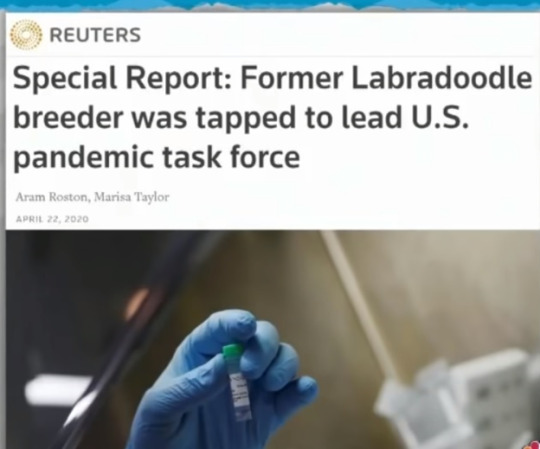
So obviously we’re in good hands. [Sarcasm alert.]
The entire planet has slowed down, such that seismologists can detect the quieting of the earth: less shuddering of industry, cars, construction. Check out the drop in electricity usage:

Here’s a bit of perspective from Instagram:
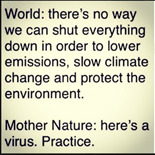
The Lesbians of Paisley have been fertile ground for viruses. Valerie is nearly recovered from the viral pneumonia she was diagnosed with on March 26 at the emergency room at Lake District Hospital. She’d begun to feel feverish and achy, with violent coughing on March 15th, 2 days after what turned into my last day in my office at the hospital’s primary care clinic, and a day and a half after we’d dined with our friends Toni, Al, Bonnie and Bruce in person, sans masks. We began 100% isolation from the outside world the minute she felt sick. She recounted the ER adventure to a friend thusly: We drove in and they have organized a system that resembles getting on a [military] base after 9-11. We sat in the pickup at the checkpoint until a somebody in protective attire had taken my temp and saturation levels and asked a bunch of questions. Then they slapped a red sticker on the dash, told us to park in the ER lot and "don't get out of the pickup." Five hours later I had donated blood and been CAT scanned. I had two pneumonia shots that were current and two flu shots, also current. They checked the blood against 14 different virus strains and came up blank. The chest showed white lungs and my saturation levels were iffy. So they used one of the tests they had been sent, gave me antibiotics (just in case) and sent me home. Took me three days to sleep off all that fun.”
Me and Griffey the poodle waited in the pickup for her. At every sound, he got up from the passenger’s seat and looked at the ER entrance where she’d disappeared. No Valerie? Back to sleep. I walked him 3 times. Hope, her RN daughter, told us that her flow through the ER was great practice in maintaining distance and perfect hygienic process through the CT scan, taking blood, even pushing her food on a tray to her. Lake Health District Hospital is prepared, and still, technically speaking, zero cases in the county.
I was so anxious about her health, her ability to breathe, that I gave up all thought of working from home. I listened to her breathing and coughing, brought her tea, and finally, asked her to write out her last will and testament. She did, and put it away. I figured, her kids are wonderful and won’t fight about stuff but, better for her to express her wishes, even if the paper wouldn’t be legally binding.
Apparently, I get the FrankenDodge (the pickup which has hit one too many deer and who’s grill is sewn together by wire). I’ll take it but I’d much rather have her.
We waited 10 days for the nasal swab results. While we waited, she got better. Never had that cytokine storm, nor that respiratory crash. Storms and crashes; pretty apt words for the medical horror of end stage COVID-19. Once her test came back negative, despite the warning of her PCP who says that nasal swabs miss between 30 and 47% of positive cases, I was able to go to town on the 10th of April, get some software downloaded onto the computer so I could work from home, and hit Safeway while wearing a mask. I also dropped off one of Valerie’s homemade masks to a friend, along with some toilet paper illustrated with Trump’s kissy face. The moment of levity was greatly appreciated.
I started feeling lousy six days after my jaunt to Lakeview (April 16th). Cough and release of gook high up in my chest. Headache. No fever. Who knows if I have COVID-19. We listen to a British gentleman, Dr. Campbell, daily, as he reviews what’s going on globally, and he interviewed a woman who had exactly my illness course, before she moved on to fever and gastrointestinal symptoms. She never got tested. Too much hassle. Which is so ridiculous, criminal really, and in the USA, a direct result of American hubris and incompetence. Fine. Anyone with any symptoms of any illness is isolated until we have a vaccine and treatment, is my prediction. I’m still feeling shitty, though better. Started taking antibiotics just in case and in the hopes of recovering SOMEDAY.
My son Jonah and his girlfriend June escaped just in time the terrible plight of New York’s COVID19 deluge of infections and hospitalizations. They’ve been in Baltimore at June’s mother’s beautiful home. He spent his 26th birthday in the basement because they were still in quarantine. See adorable picture, below. Now they’re allowed upstairs, enjoying the quiet. Apparently, writing and directing music videos is not an essential service during a pandemic, but he’s writing pitches and living off the most recent lucrative gig with Kesha, thank goodness.

One of the most moving things that is happening in the USA during this time is the 7pm clapping ritual for medical workers and first responders in New York City, in all the boroughs:
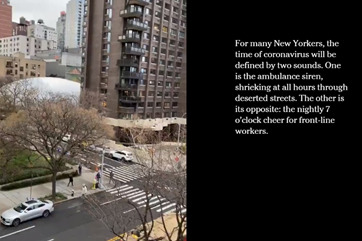
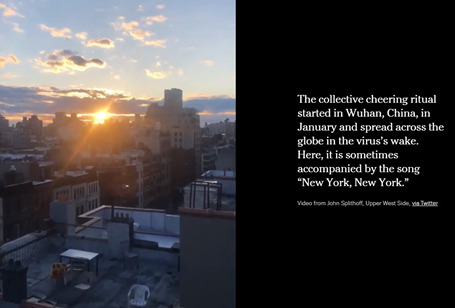
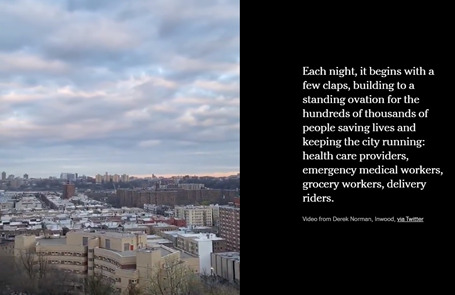
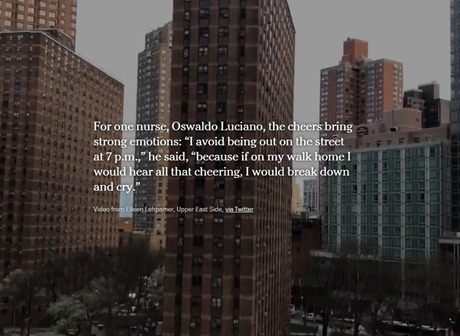
There’s a firefighter in DC who’s going to hospitals and nursing homes to play the bagpipe.
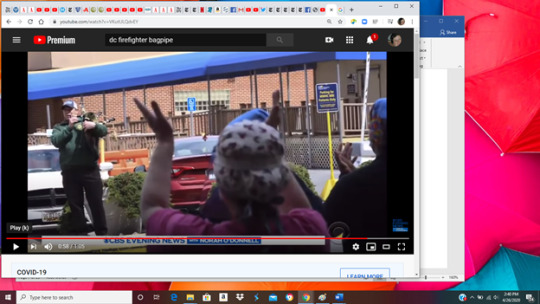
That’s where my daughter Clara lives, in DC, but right now she’s staying with a friend in Laurel, MD, since her group house dynamics are stressful and had a symptomatic guest at last report. She’s working from home to make sure the Latinx school children are getting the tutoring they need now more than ever. We worry about her husband Jose and his country, Guatemala, since there are COVID-19 cases down there, and refugees seeking asylum are being dumped there, with and without the virus. Over 700 cases in Guatemala as of today. We hope he will get to the USA this year. However, Trump referred to it as a shithole country, which doesn’t bode well.
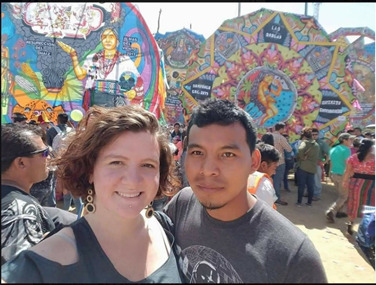
My sister and her husband are well, thankfully. They work fulltime from home in the company of Pepper the cat and Darcy the chocolate lab. Yuuki, 25, stays there, too, mostly in their room; they are out of work and applying for unemployment. Kohji, age 28, works from home in DC and makes more money as a web designer than I ever will after 34 years as a social worker, but who’s counting. (I remember well the admonition of a field instructor back in 1987: don’t go into social work for Power, Pay or Prestige.) His girlfriend is probably out of work; she works for a nonprofit that plants trees in DC. Probably not essential work right this very minute. Makoto, 23, is out of quarantine and looking for something to do; he’ll be a senior at the University of Delaware this fall. As far as I hear on Facebook and email, the rest of the folks with whom I share DNA are well. So that’s good. I worry about my Aunt Mary Lee who is 87. But she says not to: she’s fine and her ritzy retirement community in McLean, VA is on “lockdown.”
Psychologically, in the experience of quarantine and ‘social distancing’, there’s me, and then there are my clients.
My moods go up and down, but a little further down than usual. The terror that Valerie might die of COVID-19 has passed, but I figure I will always need therapy. I have “Facebook messenger” video chats with my therapist, Darcy of Bend, every other week now, which helps. Having ‘Generalized Anxiety Disorder’ and a tendency toward major depression, I find therapy to be a corrective. A bimonthly tune up. Without it, I naturally veer toward negativity and neurosis, and a hypervigilance that served me well when I was a child, but is exhausting, overwrought and over-thought as an adult.
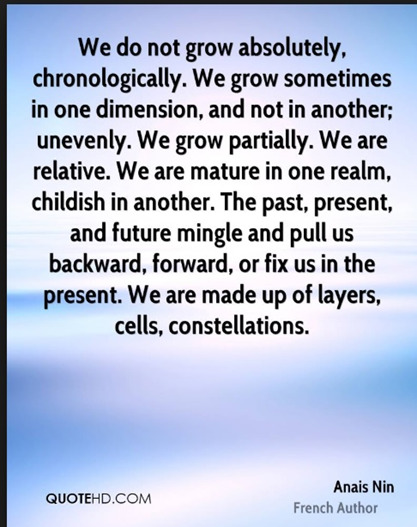
Psychologically, Valerie is always fine. Seriously. She was once told as a young woman by a therapist who’d tested her with the MMPI (the Minnesota Multiphasic Personality Inventory) that she was outrageously and puzzlingly normal. Now that she’s feeling mostly well again from the pneumonia, she’s been tearing up the joint, fixing the sump pump that apparently keeps this little house from drifting down main street on the wetlands it’s built on. Digging out the leaves from our irrigation ditch, chopping and clearing the wood from our front yard.
The BEFORE picture:
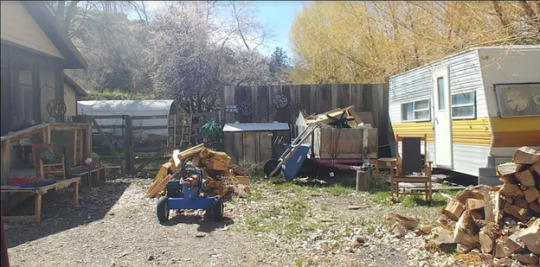
The AFTER Picture.
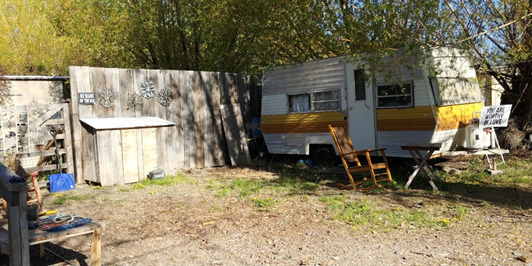
And this happened one morning in March. Just a cattle drive past our front door.

Valerie’s planning a garden at her daughter’s place, which has a deer-proof fence and lots of sun up on the hill above us. A delivery of horse manure is scheduled, and the garden bed has been rototilled. Val’s granddaughter Jessica and her husband Alan are living up there now, working from home for their Portland-based gigs. They’re almost finished the 14-day quarantine since they moved down here. The new normal: anytime anyone leaves one locale for another, they disappear into strictest quarantine, not to leave their abode. Groceries are delivered to the doorstep. A recent day turned out to be Jess’ 25th birthday: I’d bought a canvas bag with a picture of a pug on it, like her dog Archie, and Valerie found something gluten free flour mix with fresh jam to give her. Birthday gatherings are suspect at the moment.
Here’s a lovely idea for quarantined birthday celebrations:
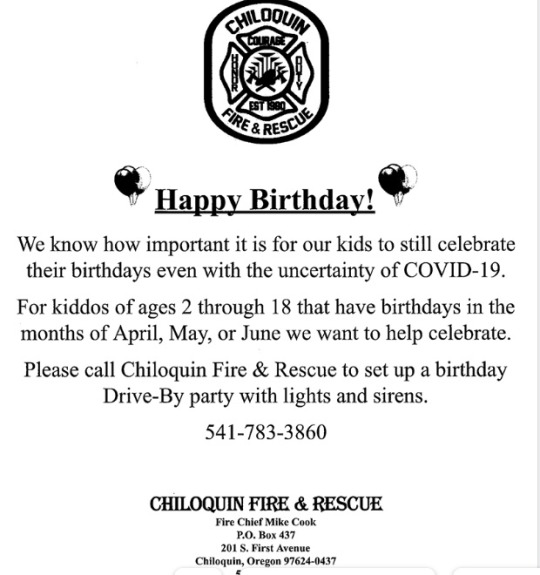
What a kind and generous offer.
Even in isolation, Val and I do socialize, on zoom. The one pictured below is church.

We ‘visit’ with our fellow parishioners from St. Luke’s on Sunday evenings. Then we say Compline together, from the Book of Common Prayer. My favorite prayer of all time is this one from that service.
Yes, shield the joyous. Because joy is fleeting.
Our writers’ group, Easy Writers, ‘meets’ on zoom every Monday now. I wrote this bit about my yarn for the prompt, ‘write something in your home that means a lot to you.’
I am doing a great deal of crochet and a little knitting.
Yarn is my comfort and my joy. It is the raw material I create blankets and scarves and hats with. My tools are hooks and needles made from wood and plastic and metal. My fingers are also my tools.
Some of the yarn is like cotton candy: spun mohair from a goat is said to have a ‘halo’ or ‘aura’ because of the gentle cloud of color you can see an inch or two away from the spun thread. Some yarn is like twine: you can see every string of ply. My favorite is merino wool and single ply. A unity of color that will not split. All for one and one for all, the fuzzy stuff is twisted and bound into a single string of strength…
My clients are stressed out. The pandemic adds a layer to the stress they were already experiencing. I listen and knit, from within the cocoon of the yarn room which my folks can see behind me. One of my clients wanders about with her phone in her hand while I get slightly dizzy. I like this kind of counseling since I get a glimpse of my clients’ homes. Reminds me a little bit of being a geriatric care manager. You can tell a lot about a person from their home. From my home you can tell that I have a lot of yarn, and I work multiple projects at a time because there are piles of them alongside my recliner.
One of the sad weights of being present for my clients is their level of estrangement for most if not all social connections, especially people with whom they share DNA. And every single one has what is called in the mental health world “complex PTSD” from multiple traumatic experiences. I sit with them, on the phone or via video. I hope to model for them what Carl Rogers called ‘unconditional positive regard.’ I breathe deeply to release my own distress at their sadness. We explore one tiny step toward reducing their isolation, the sense of trust. All during a pandemic where other people could be carrying a potentially deadly virus.
It’s no wonder I’m pawing mohair out of screen for my own comfort.
Sometimes I email clients links or articles on how to keep their spirits up, or about good things that are happening instead of the dire predictions they’re listening to or watching. There is much to share that is hopeful. I sent one to a client on creative ways to care for everyone and she shot back:
“I believe this is Liberal rhetoric.
Esp the paragraph below:
This current emergency provides the possibility for a new emergence—the birthing of a truly civil civilization dedicated to the well-being of all people and the living Earth. “
Oh well. We can’t have a truly civil civilization dedicated to the well-being of all people, now can we?
Sigh.
Brilliant writing is being penned right now, since the entire planet’s human inhabitants are barely one degree of separation away from this virus, which is apparently ‘barely alive’ and therefore hard to kill, as it spreads onward to make millions miserable and hundreds of thousands die.
I’m saving articles from The Atlantic, The NY Times, and the Washington Post, and following a historian named Heather Cox Richardson who writes a daily blog called Letters from an American. In a recent post she writes:
“The big news … has been the ‘protests’ of state governors’ stay-at-home orders and mandatory business closings to try to contain the novel coronavirus …These protests are a classic example of trying to control politics by controlling the national narrative. The protests are backed by the same conservative groups that are working for Trump’s reelection. …These are not spontaneous, grassroots protests. They are political operations designed to divert attention from the Trump administration’s poor response to the pandemic. Even more, though, they are designed to keep the American public divided so that we do not protest the extraordinary economic inequality the pandemic has highlighted.
These protests have diverted the national conversation by turning a national crisis into partisan division along the lines the Republican Party has developed since the 1980s... The change of subject protects not just Trump but also the ideology at the heart of his Republican Party. Since 1981, Republicans have argued that the economy depends on wealthy businessmen who know best how to arrange the economy—the makers-- and that it is vital to protect their interests. Under their policies, wealth in America has moved upward. The pandemic has highlighted how these policies have removed economic security for ordinary people. They cannot pay their bills, and they might well turn against an ideology that uses our tax dollars to bail out corporations while they must risk their lives to pay their rent.” [Emphasis mine]
I am so glad someone smarter than me can reveal the interconnections of what’s going on politically.
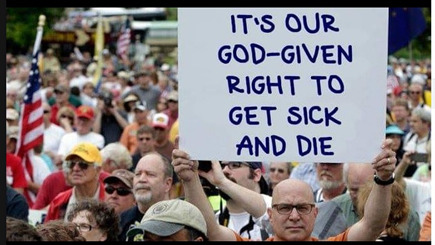
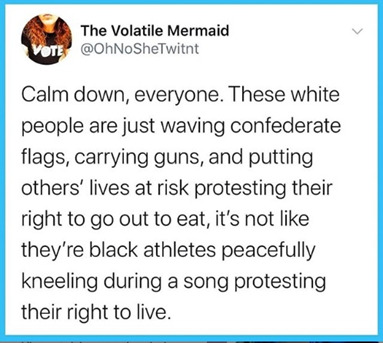
There is food for thought on Facebook and Instagram: in the guise of a rewrite of Mary Oliver’s Wild Geese, this poem.
Mary Oliver for Corona Times (after Wild Geese)
by Adrie Kusserow
You do not have to become totally zen,
You do not have to use this isolation to make your marriage better,
your body slimmer, your children more creative.
You do not have to “maximize its benefits”
By using this time to work even more,
write the bestselling Corona Diaries,
Or preach the gospel of ZOOM.
You only have to let the soft animal of your body unlearn
everything capitalism has taught you,
(That you are nothing if not productive,
That consumption equals happiness,
That the most important unit is the single self.
That you are at your best when you resemble an efficient machine).
Tell me about your fictions, the ones you’ve been sold,
the ones you sheepishly sell others,
and I will tell you mine.
Meanwhile the world as we know it is crumbling.
Meanwhile the virus is moving over the hills,
suburbs, cities, farms and trailer parks.
Meanwhile The News barks at you, harsh and addicting,
Until the push of the remote leaves a dead quiet behind,
a loneliness that hums as the heart anchors.
Meanwhile a new paradigm is composing itself in our minds,
Could birth at any moment if we clear some space
From the same tired hegemonies.
Remember, you are allowed to be still as the white birch,
Stunned by what you see,
Uselessly shedding your coils of paper skins
Because it gives you something to do.
Meanwhile, on top of everything else you are facing,
Do not let capitalism coopt this moment,
laying its whistles and train tracks across your weary heart.
Even if your life looks nothing like the Sabbath,
Your stress boa-constricting your chest.
Know that your antsy kids, your terror, your shifting moods,
are no less sacred than a yoga class.
Whoever you are, no matter how broken,
the world still has a place for you, calls to you over and over
announcing your place as legit, as forgiven,
even if you fail and fail and fail again.
remind yourself over and over,
all the swells and storms that run through your long tired body
all have their place here, now in this world.
It is your birthright you be held deeply, warmly, in the family of things, not one cell left in the cold.
-Adrie Kusserow
Not one cell left out in the cold. Yes.
There is so much to be grateful for. I have a place to live, and even while paying off my bankruptcy debt, I have plenty. Enough that I can make small donations here and there. Here’s one cause I found: supporting foster children who were in college and now have no place to go. (Terrible visuals for the logo: it’s “Together We Rise.”)
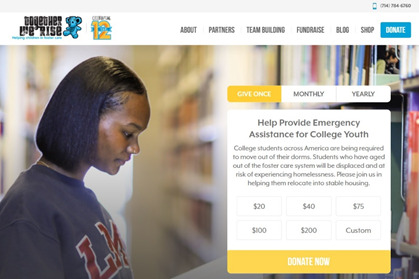
Soon, the nights of below freezing temperatures will pass, and both Lesbians of Paisley will be healthy at the same time. Perhaps I’ll get my Tricycle-for-Grownups serviced and toodle around for exercise. Perhaps the Stitch & Bitch knitting/crochet gatherings will resume, maybe in a park for physical distance and social connection.
And maybe I’ve already had Covid-19, and so has Valerie. Looks like 50-70% of all the people on the planet, not quite 8 billion humans so maybe 4 to 6 billion people, need to catch this thing in order to give our species herd immunity. Or WILL catch it because we have no way to stop it, only to slow the infections so that health care is not overwhelmed. We live and Love in the Time of Coronavirus, to paraphrase Gabriel Garcia Marquez. I maybe a libtard, a snowflake, a lily-livered liberal, who’s heart bleeds. But I agree with this sentiment, found on Facebook, our American ‘commons’:

Love absurdly and abundantly, my people. And wash your hands.
2 notes
·
View notes
Text
It’s Time for the Hospitality Industry to Listen to Black Women
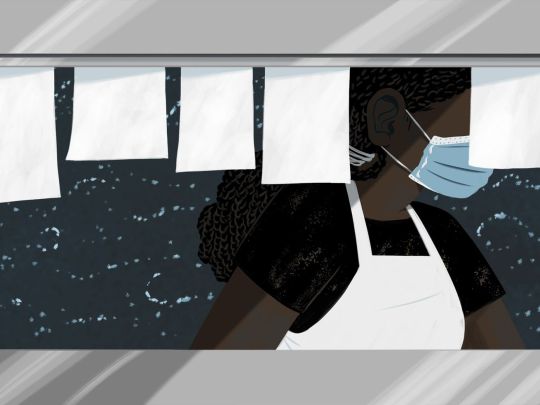
History shows us that the novel coronavirus will impact black women restaurateurs, and their businesses, much harder
Before the pandemic, our nation was in the early stages of battling an epidemic that plagued our beloved hospitality industry: the biased structural policies, born out of our country’s legacy of racism that guaranteed that black Americans would continuously work at a deficit. Painfully honest conversations — dissecting the ways in which decades of systematic racial and gender inequality festered in the industry — had finally begun to gain traction in on- and offline spaces. But, collectively, we’d barely broken through the dysfunctional infrastructure that allowed certain groups to fail harder and faster when COVID-19 struck.
Chef Deborah VanTrece was ringing the alarm prior to the coronavirus pandemic. She regularly brought discussions of industry inequality to the table through her dinner-and-conversation series that centers black women in hospitality. “It was something that we had just started talking about at Cast Iron Chronicles, and a lot of other chefs were talking about it,” says VanTrece, owner of Twisted Soul Cookhouse & Pours in Atlanta. “But the conversation wasn’t finished. It still isn’t.”
“As much as we’ve accomplished, I still feel isolated and that I am by myself. I don’t think any of us should feel that way. We should be checking on each other. It’s like [coronavirus] happened and every man for himself,” VanTrece says. “And when I think about it, we were pretty much like that in the first place; that’s why it’s so easy for it to continue now.” Isolation has become a theme in our shared new normal of stay-at-home orders, but what VanTrece is describing is a sentiment long echoed by black women in the industry. Yet seeing the divide continue during these times is heartbreaking for VanTrece. “If we were ever needing to be one, it’s now. We need to be one.”
Black and brown voices are largely excluded from overarching conversations that will define the future of our industry
As we grapple with lives lost and the magnitude of devastation caused by novel coronavirus, accountability and transparency seem to be overshadowed by crisis-led pivots while we brace ourselves for what’s to come. And yet again, black and brown voices are largely excluded from policymaking and overarching conversations that will define the future of our industry. In the face of this pandemic, some may say the pursuit of equality has been railroaded, maybe even understandably so. Others see the crisis as a hopeful confirmation that institutional change is inevitable. Because if not now, when?
In order to know where we are going, we have to understand where we’ve been. Black restaurant owners, black women especially, are in a more precarious position from the get-go. According to the latest figures, from 2017, black women were paid 61 cents for every dollar paid to their white male counterparts, making wealth generation much more difficult. And while one in six restaurant workers live below the poverty line, African Americans are paid the least. Access to capital has been a steady barrier of entry, especially for black women. Black- and brown-owned businesses are three times as likely to be denied loans, and those that are approved often receive lower loan amounts and pay higher interest rates. For a population more likely to rent than other demographics, offering up real estate as collateral for traditional loans isn’t an option. And even for those who own a home, the lasting effects of redlining, predatory and discriminatory lending practices, and low home valuations are palpable.
In other words, the wealth gap, combined with a lack of access to traditional loans and investors for start-up capital, puts black women at a disadvantage before they even open the doors of their restaurants. “A lot of us have had to build our businesses from scratch, and that may be through personal savings and loans, through family members, credit cards, or we have refinanced our homes,” says chef Evelyn Shelton, owner of Evelyn’s Food Love, a cafe serving comfort food in Chicago’s Washington Park neighborhood. “We are in uniquely different positions when we start, which makes where we are now even more difficult.”
In the East Bay, chef Fernay McPherson, owner of Minnie Bell’s Soul Movement, a food truck turned brick-and-mortar now located in the Emeryville Public Market food hall, is offering a limited carryout menu in an effort to keep her staff afloat, noting that some are single parents. “I was a single mother, so it’s a lot to take in when you’re thinking, ‘How am I going to feed my child? How am I going to make rent?’” During the Great Recession, McPherson was laid off and had to short-sell her home. She started Minnie Bell’s in 2009, as a catering company, while also working full-time as a transit operator in San Francisco. “It was hard being a mom, driving a bus, and trying to operate a business. It was a lot on me. And my decision was me. To work for me.”
Working multiple jobs is a necessary for many entrepreneurs whose bootstraps are shorter to begin with, says Lauren Amos, director of small-business development at Build Bronzeville, a Chicago incubator that advocates for South Side business owners. “We’re talking about people literally working a full-time job, supporting themselves and their family while still pursuing this dream of opening a business,” she says. “And they’re doing it out of their own physical pocket.”
McPherson, a San Francisco Chronicle 2017 Rising Star Chef, says it was tough getting a job in the restaurant industry after culinary school. “I came into a white, male-dominated field and I was a young, black woman that wasn’t given a chance. My first opportunity was from another black woman and I worked in her restaurant.” Access to a solid professional network, including mentors, is absolutely as vital as access to capital — social capital is another part of the ecosystem, and can be a bridge to resources necessary for growth. But without the right connections, strong networks may be hard to plug into, and exclusion from these networks can have a stifling effect on one’s career.
McPherson has steadily established a solid network over the years. Now, she’s envisioning what her post-pandemic future will look like, including a possible alliance with other women chef-owners. “We’re talking about collectively developing our own restaurant group, in a sense, where we can build a fund for each member, build benefits for our employees, and build career opportunities,” she says.
In coming weeks and months, people in many industries will be taking stock of what could have been done better. But for now, McPherson’s most pressing need is capital to be able to restart.
Studies show that African-American communities were hit hardest by the Great Recession. According to the Social Science Research Council, black households lost 40 percent of wealth during the recession and have not recovered, but white households did. Unemployment caused by the recession disproportionately affected black women, a double-edged sword for many of whom worked lower-wage jobs that relied on tips. The costs of these disparities are far reaching. Six years after a defunct grocery chain shut its doors, creating a food desert in the Chicago South Side neighborhood of South Shore, a new grocery store finally opened — just last December — a few months before the pandemic.
Black communities are undervalued. “Mom-and-pop,” a term of endearment that acknowledges the fortitude and nobility in owning a small business, is rarely applied to black-owned businesses. Racial discrimination and biased perceptions of black-owned restaurants in black communities costs them billions of dollars in lost revenue. Disinvestment in these communities sets the landscape for quick-service restaurant chains to flourish, as professor Marcia Chatelain eloquently lays out in Franchise: The Golden Arches in Black America, all of which presents added pressure for the competing independent restaurant owners, whose margins are already miniscule.
“We’re truly hanging on by a thin thread,” Shelton says. She encourages local legislators to call on neighborhood restaurants and caterers to feed people who are food insecure, as well as individuals at the 3,000-patient field hospital erected at McCormick Place, the Chicago convention center that already houses Shelton’s now-closed second location. Meanwhile, Shelton regularly delivers meals to the ER staff at a neighboring hospital, paid for out of her own pocket.
Disparities in restaurants are emblematic of the nation. Indicators show that African-American communities are hit the hardest by COVID-19. ProPublica sums it up: “Environmental, economic, and political factors have compounded for generations, putting black people at higher risk of chronic conditions that leave lungs weak and immune systems vulnerable: asthma, heart disease, hypertension and diabetes.” And a lack of access to quality health care means the novel coronavirus has the potential to disproportionately decimate black communities, and the independent restaurants within them, if adequate support is not provided.
History shows us that the most vulnerable are left behind, and a similar pattern will likely occur post-pandemic. “The difference is the ability to be able to bounce back,” says Build Bronzeville’s Amos. When the pandemic hit, her organization swiftly aligned with other South Side organizations to urgently deliver vital information to small-business owners through grassroots efforts. “This is not a drill. Now is the time for all of us who want to be resource providers and boil it down for people,” Amos says.
Recognizing that communities with the most funding will have the greatest chance for survival, Amos leverages her relationships and personally calls and sends texts to restaurateurs conveying time-sensitive information like grant deadlines — she has become a lifeline for vulnerable small-business owners during this critical time. Amos has also extended assistance to Dining at a Distance, a delivery and takeout directory, after noticing its site had robust coverage of hot spots in the city, but little representation of South Side restaurants. Amos became a link and added a slew of South Side restaurants to the platform, noting that consumer-facing exposure is urgently needed. “A grim reality is that we have to capture these dining-out dollars now,” she says, “because there will come a point where people will stop ordering out because it just won’t be fiscally responsible for them to do so.”
As we envision a new path for the hospitality industry, black women must be central to the conversation: Their journeys hold wisdom that is widely absent from in-depth studies and data. And there’s no better industry to lead change than one known for breaking bread.
To support her community and staff, VanTrece has launched a pay-what-you-can menu at Twisted Soul, thinking of the model as a fundraiser of sorts. “This is a whole new pricing structure. You’re not pricing to pay the bills and pay the rent,” says VanTrece, whose landlord told her she wouldn’t have to pay a late fee on her rent, which is $10,000 a month. In addition to cashing in her credit card points for gift cards for her staff, she’s turned her restaurant into a hub where they can quickly grab necessities like a hot meal and toilet paper. It’s a service most of her team participates in. “But then I have some that are just scared,” she says. “They don’t want to come and I can’t blame them.”
On a recent Friday, a carryout fish fry was on VanTrece’s menu, a reminder of the ones she grew up going to during better days. She looks to the past for guidance often. “At Cast Iron, we always talked about the strength and the tenacity of our forefathers, and I’m calling upon that strength now to keep me putting one foot in front of the other, because there are times I just want to roll over,” she says. “And I can’t do that. I fought to get this far and I’m going to continue to fight through this.”
Angela Burke is a food writer and the creator of Black Food & Beverage, a site that amplifies the voices of black food and beverage professionals. Shannon Wright is an illustrator and cartoonist based out of Richmond, Virginia.
from Eater - All https://ift.tt/3bi4741
https://ift.tt/3bj5Juk

History shows us that the novel coronavirus will impact black women restaurateurs, and their businesses, much harder
Before the pandemic, our nation was in the early stages of battling an epidemic that plagued our beloved hospitality industry: the biased structural policies, born out of our country’s legacy of racism that guaranteed that black Americans would continuously work at a deficit. Painfully honest conversations — dissecting the ways in which decades of systematic racial and gender inequality festered in the industry — had finally begun to gain traction in on- and offline spaces. But, collectively, we’d barely broken through the dysfunctional infrastructure that allowed certain groups to fail harder and faster when COVID-19 struck.
Chef Deborah VanTrece was ringing the alarm prior to the coronavirus pandemic. She regularly brought discussions of industry inequality to the table through her dinner-and-conversation series that centers black women in hospitality. “It was something that we had just started talking about at Cast Iron Chronicles, and a lot of other chefs were talking about it,” says VanTrece, owner of Twisted Soul Cookhouse & Pours in Atlanta. “But the conversation wasn’t finished. It still isn’t.”
“As much as we’ve accomplished, I still feel isolated and that I am by myself. I don’t think any of us should feel that way. We should be checking on each other. It’s like [coronavirus] happened and every man for himself,” VanTrece says. “And when I think about it, we were pretty much like that in the first place; that’s why it’s so easy for it to continue now.” Isolation has become a theme in our shared new normal of stay-at-home orders, but what VanTrece is describing is a sentiment long echoed by black women in the industry. Yet seeing the divide continue during these times is heartbreaking for VanTrece. “If we were ever needing to be one, it’s now. We need to be one.”
Black and brown voices are largely excluded from overarching conversations that will define the future of our industry
As we grapple with lives lost and the magnitude of devastation caused by novel coronavirus, accountability and transparency seem to be overshadowed by crisis-led pivots while we brace ourselves for what’s to come. And yet again, black and brown voices are largely excluded from policymaking and overarching conversations that will define the future of our industry. In the face of this pandemic, some may say the pursuit of equality has been railroaded, maybe even understandably so. Others see the crisis as a hopeful confirmation that institutional change is inevitable. Because if not now, when?
In order to know where we are going, we have to understand where we’ve been. Black restaurant owners, black women especially, are in a more precarious position from the get-go. According to the latest figures, from 2017, black women were paid 61 cents for every dollar paid to their white male counterparts, making wealth generation much more difficult. And while one in six restaurant workers live below the poverty line, African Americans are paid the least. Access to capital has been a steady barrier of entry, especially for black women. Black- and brown-owned businesses are three times as likely to be denied loans, and those that are approved often receive lower loan amounts and pay higher interest rates. For a population more likely to rent than other demographics, offering up real estate as collateral for traditional loans isn’t an option. And even for those who own a home, the lasting effects of redlining, predatory and discriminatory lending practices, and low home valuations are palpable.
In other words, the wealth gap, combined with a lack of access to traditional loans and investors for start-up capital, puts black women at a disadvantage before they even open the doors of their restaurants. “A lot of us have had to build our businesses from scratch, and that may be through personal savings and loans, through family members, credit cards, or we have refinanced our homes,” says chef Evelyn Shelton, owner of Evelyn’s Food Love, a cafe serving comfort food in Chicago’s Washington Park neighborhood. “We are in uniquely different positions when we start, which makes where we are now even more difficult.”
In the East Bay, chef Fernay McPherson, owner of Minnie Bell’s Soul Movement, a food truck turned brick-and-mortar now located in the Emeryville Public Market food hall, is offering a limited carryout menu in an effort to keep her staff afloat, noting that some are single parents. “I was a single mother, so it’s a lot to take in when you’re thinking, ‘How am I going to feed my child? How am I going to make rent?’” During the Great Recession, McPherson was laid off and had to short-sell her home. She started Minnie Bell’s in 2009, as a catering company, while also working full-time as a transit operator in San Francisco. “It was hard being a mom, driving a bus, and trying to operate a business. It was a lot on me. And my decision was me. To work for me.”
Working multiple jobs is a necessary for many entrepreneurs whose bootstraps are shorter to begin with, says Lauren Amos, director of small-business development at Build Bronzeville, a Chicago incubator that advocates for South Side business owners. “We’re talking about people literally working a full-time job, supporting themselves and their family while still pursuing this dream of opening a business,” she says. “And they’re doing it out of their own physical pocket.”
McPherson, a San Francisco Chronicle 2017 Rising Star Chef, says it was tough getting a job in the restaurant industry after culinary school. “I came into a white, male-dominated field and I was a young, black woman that wasn’t given a chance. My first opportunity was from another black woman and I worked in her restaurant.” Access to a solid professional network, including mentors, is absolutely as vital as access to capital — social capital is another part of the ecosystem, and can be a bridge to resources necessary for growth. But without the right connections, strong networks may be hard to plug into, and exclusion from these networks can have a stifling effect on one’s career.
McPherson has steadily established a solid network over the years. Now, she’s envisioning what her post-pandemic future will look like, including a possible alliance with other women chef-owners. “We’re talking about collectively developing our own restaurant group, in a sense, where we can build a fund for each member, build benefits for our employees, and build career opportunities,” she says.
In coming weeks and months, people in many industries will be taking stock of what could have been done better. But for now, McPherson’s most pressing need is capital to be able to restart.
Studies show that African-American communities were hit hardest by the Great Recession. According to the Social Science Research Council, black households lost 40 percent of wealth during the recession and have not recovered, but white households did. Unemployment caused by the recession disproportionately affected black women, a double-edged sword for many of whom worked lower-wage jobs that relied on tips. The costs of these disparities are far reaching. Six years after a defunct grocery chain shut its doors, creating a food desert in the Chicago South Side neighborhood of South Shore, a new grocery store finally opened — just last December — a few months before the pandemic.
Black communities are undervalued. “Mom-and-pop,” a term of endearment that acknowledges the fortitude and nobility in owning a small business, is rarely applied to black-owned businesses. Racial discrimination and biased perceptions of black-owned restaurants in black communities costs them billions of dollars in lost revenue. Disinvestment in these communities sets the landscape for quick-service restaurant chains to flourish, as professor Marcia Chatelain eloquently lays out in Franchise: The Golden Arches in Black America, all of which presents added pressure for the competing independent restaurant owners, whose margins are already miniscule.
“We’re truly hanging on by a thin thread,” Shelton says. She encourages local legislators to call on neighborhood restaurants and caterers to feed people who are food insecure, as well as individuals at the 3,000-patient field hospital erected at McCormick Place, the Chicago convention center that already houses Shelton’s now-closed second location. Meanwhile, Shelton regularly delivers meals to the ER staff at a neighboring hospital, paid for out of her own pocket.
Disparities in restaurants are emblematic of the nation. Indicators show that African-American communities are hit the hardest by COVID-19. ProPublica sums it up: “Environmental, economic, and political factors have compounded for generations, putting black people at higher risk of chronic conditions that leave lungs weak and immune systems vulnerable: asthma, heart disease, hypertension and diabetes.” And a lack of access to quality health care means the novel coronavirus has the potential to disproportionately decimate black communities, and the independent restaurants within them, if adequate support is not provided.
History shows us that the most vulnerable are left behind, and a similar pattern will likely occur post-pandemic. “The difference is the ability to be able to bounce back,” says Build Bronzeville’s Amos. When the pandemic hit, her organization swiftly aligned with other South Side organizations to urgently deliver vital information to small-business owners through grassroots efforts. “This is not a drill. Now is the time for all of us who want to be resource providers and boil it down for people,” Amos says.
Recognizing that communities with the most funding will have the greatest chance for survival, Amos leverages her relationships and personally calls and sends texts to restaurateurs conveying time-sensitive information like grant deadlines — she has become a lifeline for vulnerable small-business owners during this critical time. Amos has also extended assistance to Dining at a Distance, a delivery and takeout directory, after noticing its site had robust coverage of hot spots in the city, but little representation of South Side restaurants. Amos became a link and added a slew of South Side restaurants to the platform, noting that consumer-facing exposure is urgently needed. “A grim reality is that we have to capture these dining-out dollars now,” she says, “because there will come a point where people will stop ordering out because it just won’t be fiscally responsible for them to do so.”
As we envision a new path for the hospitality industry, black women must be central to the conversation: Their journeys hold wisdom that is widely absent from in-depth studies and data. And there’s no better industry to lead change than one known for breaking bread.
To support her community and staff, VanTrece has launched a pay-what-you-can menu at Twisted Soul, thinking of the model as a fundraiser of sorts. “This is a whole new pricing structure. You’re not pricing to pay the bills and pay the rent,” says VanTrece, whose landlord told her she wouldn’t have to pay a late fee on her rent, which is $10,000 a month. In addition to cashing in her credit card points for gift cards for her staff, she’s turned her restaurant into a hub where they can quickly grab necessities like a hot meal and toilet paper. It’s a service most of her team participates in. “But then I have some that are just scared,” she says. “They don’t want to come and I can’t blame them.”
On a recent Friday, a carryout fish fry was on VanTrece’s menu, a reminder of the ones she grew up going to during better days. She looks to the past for guidance often. “At Cast Iron, we always talked about the strength and the tenacity of our forefathers, and I’m calling upon that strength now to keep me putting one foot in front of the other, because there are times I just want to roll over,” she says. “And I can’t do that. I fought to get this far and I’m going to continue to fight through this.”
Angela Burke is a food writer and the creator of Black Food & Beverage, a site that amplifies the voices of black food and beverage professionals. Shannon Wright is an illustrator and cartoonist based out of Richmond, Virginia.
from Eater - All https://ift.tt/3bi4741
via Blogger https://ift.tt/2RKiM0b
0 notes
Text
Indonesia’s first 3 COVID-19 patients open up about online hate and stigmatisation
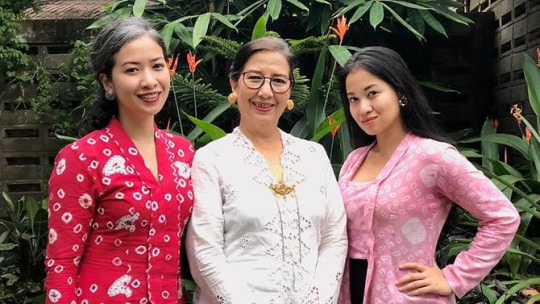
JAKARTA: "Because of you, my wedding is now cancelled," said one social media post.
"Because of you, my graduation is cancelled," said another.
There was also another post that said: "Because of you, I lost my job."
These negative messages were among the many that Sita Tyasutami received since last month. She also got death threats.
The 30-year-old is known in Indonesia as Case 01, the first person who was tested positive for COVID-19 in the country.
She has since recovered from the illness, but hate messages are still appearing in her social media accounts.
“They still get me sometimes,” she said during a phone interview on Monday (Apr 6).
Tyasutami, who is a professional dancer and an independent performing arts manager, was declared positive on Mar 2, after being sick for some days.
When President Joko Widodo broke the news on that Monday morning that the country had its first two COVID-19 cases, Tyasutami did not even know that she had the disease.
Although she and her mother Maria Darmaningsih, who became known as Case 02, were already warded in separate rooms at Jakarta’s Infectious Disease Hospital Sulianti Saroso, it never crossed her mind that they both had COVID-19.
Tyasutami’s older sister Ratri Anindyajati, who is an independent producer and arts manager, was the one who broke the news to her mother.
“Ratri called me. She was so nervous,” Darmaningsih, 64, recounted.
“I turned on the TV and I saw the news about Mr Jokowi announcing the country’s first two COVID-19 cases. I was like: 'Oh my goodness' ... I felt so broken."
A nurse was coincidently in Darmaningsih’s room when Anindyajati called.
But she couldn’t verify whether Darminingsih and her younger daughter Tyasutami had COVID-19.
MEDIA FRENZY AT THEIR HOUSE
Mr Widodo did not mention the names of the country’s first two COVID-19 cases. But within minutes, messages started to circulate on Whatsapp indicating Tyasutami’s and Darmaningsih’s initials. Their health records and complete home address were also made known.
A few hours after Mr Widodo made the announcement, the health minister also held a press conference revealing details and the medical history of Case 01 and 02. What was announced matched the profile of Tyasutami and Darmaningsih.
“I asked a nurse who was visiting me in my room whether there were other patients currently warded at the hospital,” said Tyasutami.
“The nurse said no. So it must be us the president was talking about!” Tyasutami recounted.
At that stage, the nurses said they had no details on what was going on.
Tyasutami and her mother later found out that it is the protocol in Indonesia that during a specific disease outbreak, the president must first be informed before the patients are made aware.
The day did not unfold well, according to Tyasutami, Darmaningsih and Anindyajati.
A flood of messages filled their handphones, asking them various questions.
Journalists flocked to their house in Depok city, on the outskirts of Jakarta, while health officials raced to disinfect their house and test everyone living there, including Anindyajati.
The 33-year-old artist actually resides in Vienna, Austria, but she has been in Indonesia since February for professional and family matters.
ALL THREE TESTED POSITIVE FOR COVID-19
Just like her younger sister and her mother, Anindyajati was ill towards the end of February.
All three of them had been suffering from a combination of complaints such as itchy throat, fever and joint pain.
But Anindyajati quickly recovered and took her mother and sister to a local hospital in Depok on Feb 27.
Tyasutami was originally diagnosed with bronchopneumonia and Darmaningsih with typhus.
They were both hospitalised. Tyasutami later heard from a friend that she had attended the same dance event as a foreigner. The latter later went to Malaysia and tested positive for COVID-19.
Tyasutami did not know the lady but she immediately thought that she should be swabbed for COVID-19.
She and her mother were then transferred from the hospital in Depok to Jakarta’s Infectious Disease Hospital Sulianti Saroso.
Once officials knew Tyasutami and Darmaningsih were COVID-19 positive, Anindyajati also underwent a swab test.
Her result was also positive. She was warded at the same hospital on Mar 5 and became known as the country’s Case 03.
ROAD TO RECOVERY
“Clinically, our symptoms were mild. Maybe out of everyone, I had the worst symptoms,” Tyasutami said.
“When I was hospitalised, I only had a cough. It was a bad cough ... But when I was told I was positive and with all the stigma surrounding me, I was so stressed. My health got worse in the first few days."
People bombarded her social media accounts, sending nasty messages and blaming her for bringing the disease into the country. She set her accounts to private mode.
“I had high blood pressure ... up to the point when I could hear and feel my heart beating. It was so loud and fast. I started to vomit ... so it was really stressful,” Tyasutami recounted.
All three of them didn’t have any underlying conditions and they were generally fit.
“How did I recover? I just tried to be happy, which was very difficult at first. But then Ratri, my mom, my whole family, my friends, and even friends whom I haven’t seen in 15 years were all supporting me."
"And then my photos were being circulated ... Ratri said because we had quite a few followers, let’s make positive campaigns. 'I’ll make the wordings, you just need to repost',” said Tyasutami who is also a dance teacher.
SUPPORT FROM FRIENDS AND FAMILY
They started to share positive messages on social media. They also replied to messages from people who wanted to know what their symptoms were and other questions relevant to COVID-19.
Both sisters were in separate rooms. However, as the rooms were on the same hallway, they could see each other.
They kept themselves busy by exercising and practising yoga. Tyasutami even did handstands and was warned by the nurses who monitored them on the CCTV to be careful.
The three of them also wore a bit of makeup to feel better. They meditated together online, together with their families who live in other cities.
Meanwhile, Darmaningsih continued to dance in her isolation room.
Family support was the most important factor to recovery, she added.
On Mar 13, Tyasutami and Anindyajati were discharged.
The two sisters were happy, but worried at the same time.
“I felt bad because I didn’t want to leave mom behind,” said Anindyajati.
Three days later, Darmaningsih could finally go home.
The experience has made them more health-conscious.
They try to drink more water and Darmaningsih, who is the founder of the Indonesian Dance Festival, tries to rest more.
Since everyone is encouraged to stay home, the sisters are trying to spread positive campaigns to counter the hate messages which they are still receiving.
They have been approached to join fundraising campaigns for COVID-19 causes. Some people are also seeking emotional support from them.
“When the positive campaigns started, we had people who were so encouraging. They were telling us that listening to our stories made them feel very calm," Anindyajati said.
“We just keep going because we know we’re all in the same boat."
0 notes
Text
Worldwide check-ins from Civic Initiative alumni during the COVID-19 epidemic (part 3 with continuing updates)
Mike Hannahan, director of the UMass Civic Initiative, asked alumni last week about how the COVID-19 pandemic was affecting them and what they were doing to take care of themselves during this unprecedented time across the world. Here are there responses, categorized by country.
The responses are to two questions: How has the coronavirus changed your life? How are you taking care of yourself?
###
Iraq
Greetings from Baghdad. I am an Iraqi Young Leaders Exchange Program (IYLEP) alumnus from 2015 and currently working as a medical doctor in the emergency room of one of Baghdad biggest hospitals, a hospital that provides (along with another smaller hospitals) medical care for approximately 5 million people! The hospital was so crowded before corona as usual, and when the first corona case was reported in Iraq, we were in alarm and we knew that things are going to change! Because we know our government and its limited resources.
We were waiting the first case to be reported in our hospital carefully, looking at any patient in the ER and expecting them to be a corona patient, but since we are in a war against that tiny evil, it came to us from where we didn’t expect! And old man in the cardiac care unit whom denied any travel history and was admitted 6 days ago started to deteriorate, despite of the proper management and care, unfortunately we lost him the day after! Then, his relatives confessed his being at Iran a couple weeks prior to admission and that explained everything!
We sent samples for PCR and the results came positive the day after! We were shocked! Because 21 doctors 6 nurses and patients nearby him were in direct contact with that man! Half of the hospital staff went to quarantine! Luckily, I wasn’t among them but continued working extra time to keep the hospital serving the people in need. Days after that, most of the cases in the ER were respiratory cases and many of them were corona positive! Among them, a woman came in late stage of the disease and died at the same day she was admitted, her body is still in the hospital and today is her 15 days without been buried! She did not have burial or sorrow ceremonies like any other, and this was inhumane!
Those days in the war against corona virus revealed another enemy that is more aggressive than the Corona itself! The illiteracy! People didn’t commit to quarantine! Suspected cases are leaving the isolation units! And finally, a highly suspected woman whom her husband refused to isolate her and threatened me with punishment if I put her in isolation! And the next day revealed that she was positive and the police put all the family in the isolation units.
And here i am, writing this in my 25 days at hospital, standing against corona that will be vanished in months, and illiteracy which will last longer.
Egypt
So we can all see that coronavirus has affected a lot of people's lives. From my point of view it came to teach us, to let us more aware about what we were having and what we were doing but now we are all at our houses trying to stay safe.
My life has stopped. I was working then the company changed the policy to work from home but now we are all in an open vacation not working, not getting our salaries, not doing anything. At first in the organization I was working in, we were trying to spread awareness through making online campaigns and live sessions but even now no one is working.
Also I was planning to visit the US this summer. I wanted to check on with the people that gave me the best experience during my previous experience in SUSI program. I wanted to come in June then to spend the 4th of July. But now I don't know if I will be able to do that or not. Besides that, I was going on an exchange program to Portugal but the airports stopped working 12 days before.
Now I'm staying at home, trying to find online jobs but because of the poor internet connection it is not easy nowadays. I'm learning Spanish now, and trying to learn Tango. What I really want to focus on now is to discover and explore myself more. In addition to try different and new things.
So now, I'm always staying at my home to be safe. I just go out if something is urgent, and I go out using gloves, masks, and alcohol. And after coming back before entering the house I take off my shoes outside, then go to wash my hands and use the alcohol again, then putting all my clothes in the washing machine separately.
Wish you a peaceful & healthy life. Stay safe.
Argentina
Strict quarantine since March 20, no school for my daughter since March 16th. We are both confined. I'm working from home, but fearing I may lose my job if this situation continues. I have just left my apartment twice to buy some groceries at local shops around the corner. I have not seen my family or friends who live in the same city, since March 15th, the day before the first regulations were started by the federal government.
How are you taking care of yourself? Following the rules, practicing social distance.
Pakistan
It's a hard time for health workers. With increasing numbers of patients, not only their care but self-prevention has become a challenge. With all this, it's been a reminder to rejoice little things in life and not take normal daily routine for granted after the fight against COVID-19 is over. This has made me more thoughtful and grateful in life. I could really use some fresh air and a long walk when all this is over soon, hopefully. And a face-to-face chit chat over a coffee with my friends.
I'm following the prevention guidelines thoroughly and making sure I will never be the reason somebody gets it. That's the responsibility falling on all of us and we must play our part.
United States (from a member of the Civic Initiative staff)
The coronavirus has completely changed all of my plans for the spring of 2020. First and foremost, I thought I would be spending this week recovering from the jet lag of a two week trip to Islamabad. I also envisioned myself having plenty of time in the warm weather to visit all of my favorite spots in the Pioneer Valley before I move away from Amherst for the foreseeable future. However, as my mom keeps reminding me, "Change the way you look at the things, and the things you look at change." Though life is not going according to plan, I am super thankful to have this time with my family. My brother, sister, and I are all quite close to moving away from our childhood home permanently, and it has been years since we all lived together under the same roof!
With the extra time in my schedule, I am trying to solidify some healthy habits in my life. Aside from online school, I aim to do something physical and something creative every day. Some days I take my dogs for a walk and then read a book. Other days, I go for a run and come home to work on my doodling/sketching skills. It is cool to be able to spend my time on activities that normally fall to the bottom of my list of priorities.
New Zealand
We have all been in a total national ‘lockdown’ for a week. Only people working in essential services are allowed to move around, the rest of us are confined to home except to go shopping, the Dr. or for neighbourhood walks. People over 70 are not even allowed to go to the grocery store. My mum and mother-in-law are both stuck at home, on their own. Police are out and about questioning people’s movement, which is very weird, but currently accepted by the population as necessary. The rate of infection is still going up every day (we are at 650 today) and they expect the numbers to keep going up for another 7-10 days. All travel in and out of the country has been suspended and our national airline is now running 5% of its previous scheduled flights. New Zealand’s economy is very heavily dependent on tourism, foreign students (especially from China and India) and dairy exports. The first two have completely stopped, and look to be suspended for a year or more, so the NZ economy is going to be very badly hit, with huge redundancies. The government (we have a left-wing one at the moment) has provided income assistance for everyone made unemployed by the virus and mortgage support for people who would otherwise lose their homes. These measures will soften the blow but not stop hardship.
Like everyone else our family (my husband, 17-year old son and me) is confined to home and will be for another 3 weeks, although word is that the government is thinking of extending it for another 2 weeks after that. I’m not sure what will happen when we all come out again. Maybe the government will stagger things across the country so that the health services can cope. All schools and universities are shut so we are all learning how to teach and learn online.
Watching how the virus is affecting Italy, Spain, the US, the UK is shocking, and these countries have huge health care resources. Wishing all friends and other alumni and their communities all best wishes for getting through this pandemic!
Pakistan
The government imposed a partial lock down and authorities have restricted non-essential travel. I have not stepped out of the home for the last 6 days but I have set timetable for myself, which includes official work from home and other co-curricular activities such as cutting grass in lawn and playing badminton with my family members. It’s pretty hard to work from home in this challenging time as there's no way to avoid all interruptions from your family and visitors. Many in our area are taking the COVID-19 lightly and are not following the government guidelines. For them, it’s business as usual. Sometimes your family will interrupt you—like if your kid just got hurt. Sometimes, due to lack of human interaction I feel loneliness and I miss the gathering of colleagues and friends but we hope we will soon overcome this crisis and will be able to start our routine life.
I’m following the government guidelines of social distancing, staying at home and health & hygiene. I have also started healthy diet by taking more fluids to boost my immune and to be ready to face the COVID-19.
Pakistan
I have five daughters and son, all are adult and students. All public and private schools are closed since Feb. 2020. My children are staying in home, which is the first time and long time staying at same time in the home. These months are usually yearly examination time. All children are preparing for examinations, but the government announced all schools and universities will be remain closed until May 2020. Now children are busy in cooking, sewing, stitching, online learning. and video films with whole family.
I am also dependent on my salary. We have no money to spend on future food expenses. Today, the government is announcing that conditions are going be worse day by day.
As a social worker, my community members, and daily wage earners which are living near to me are calling me and want finances and food for their families. I am telling them that the government is doing some planning for them. I have also given technical support to poor people to register for an online portal because 70% of daily wage earners are uneducated and they have no facility of internet. So, I am trying my best with their registration with government.
Pakistan
The spread of pandemic COVID-19 has made sure that we won’t be seeing the world like we were used to before. Nothing is going to be same as before. We will encounter new challenges, down-sizing, recession of financial positions.
But, every recession is a beginning of a new rise. We may learn a life worth-living with a totally changed perspective, vision, re-shuffling of priorities, new ways of living, interacting and working. In order to contribute towards social responsibility, social distancing is the least you can do for yourself and for the others! Keep distance! That’s the only way you can protect yourself and others from this pandemic! Stay Home! Stay Safe!
1 note
·
View note
Text
Its 1:26 pm
warm/Memorial Day/never forget
Welcome to 8 Questions with…….
Today’s interview is a little different in a couple of ways. Today’s guest,Blaine Kelley,is my first politicallt active guest. Now I usually find the folks I talk with via Facebook or a third party. But Blaine is also my first Twitter guest,he and I have been friends on that platform for around three years now.
And yes,Blaine is one of the most active voices against Donald Trump and his fascist regime. He posts different news articles,gets out in the street and encourages everyone to excercise their right to vote no matter how hard the Republicans are trying to deny and suppress that right.
I have found Blaine to be a warm and generous man who loves his family and his country. He is willing to discuss just about anything as well….in fact he and I have had some really nice chats about life in general. What I respect most about Blaine is that he will be friends with just anyone based on face value,he doesn’t judge anyone and lets their actions speak for themselves. In today’s world,that is rapidly becoming a rare trait.
I know by posting this interview that I am showing where I stand in today’s world and while I plan to interview other activists,my blog is not a political one nor will it become one. Simply because I think politics are dead and good people like Blaine Kelley are fighting for the life and the future of this country.
So I hope you will really read the answers to the 8 Questions (plus a couple more) that I asked Blaine Kelley……
Please introduce yourself and share a little bit of your background with us.
Hello- My name is Blaine Kelley. I am from central California. I have always lived here and have no desire to live elsewhere. I went to school at Pepperdine University where I studied Economics and Literature. I Attended Law School at Southern Cal. I worked as a civil attorney for over a decade until I burned out on the grind. My mother was suffering from cancer and I spent several years attending to her while she battled it. I began to feel the need to go back to work so I invested in a construction corporation and became a board member and the VP of operations. I continued this for a decade finally selling my shares and entering the corporate consulting world.
How are you and your family coping with the Covid-19 lockdown?
During this time I met my spouse and we relocated from San Diego to The Bay Area. When Covid-19 struck I had been following the science for several months. I was not surprised at the lightening speed of the spread in the US. I was prepared. We have been sheltering In place longer than most of the country and it shows on the infection growth curve for California. I feel very lucky for this. We have two children, 10 and 14, whom I have taken the responsibility of educating during the pandemic. Many of you know this is quite a challenge. Beyond this the “lockdown’ has presented many obstacles: Being isolated from friends and family is a challenge the video calling only partially overcomes. Further it is a daily challenge to stay physically mentally and physically fit without access to the “normal” outlets that keep me and my family on an even keel.
When did you become politically active and what was the issue that peaked your interest?
I am 50 and became interested in politics during high school. The Iran Contra Affair was interesting because my best friends neighbor was arrested for weapons trafficking. We lived in a small beach community so this was A BIG DEAL. My family was always involved in political activities. My grandfather was a contemporary of Cesar Chavez and Delores Huerta. He marched with the farmworkers from Delano to Sacramento. It wasn’t uncommon to visit them and dine with famous social and political figures. The strong pro-union sentiment is something I still support and am proud of to this day. Political corruption has always been one of my main areas of interest when thinking about the political perspective. Weather local or national, corruption has been and will be, the single biggest danger to the democratic ideal most Americans cherish.
What is “the Resistance”?
The Resistance to me is merely a group of citizens who are fed up with the corruption that is choking our Democracy right now. We see the questionable validity of our election process, and more importantly, the disastrous results that political apathy and general ignorance have delivered upon us all. Within my circle of allies you will find individuals from across the political spectrum. What we have in common is a passionate love of our Country and a steadfast belief in the Rule Of Law. Without fair and balanced laws society will not function as envisioned by the founders, the citizenry, and the our allies across the world who, by necessity, need the United States to be the Beacon of Justice for the World.
Do you feel only having two political parties have led us down this path in which we have a fascist president? What three things would you reform if you could do so?
I have little experience with anything other than the two party system. Accordingly, my thoughts on a parliamentary system are not favorable. I think 90-95 percent of Americans all want the same thing but want to take a different route across town to reach the destination. Accordingly, more parties won’t solve this issue but more imput and cooperation will.
Do you feel a corporate owned press does more damage then good and why/why not?
The so called free press is partially at fault for the current fiasco we have in Washington. We have ZERO requirements that “the press” report Facts, Truth, or anything advising the consumer that opinion is being presented as NEWS. This is an epic failure of Congress and the Courts. It is difficult to determine if the big three (MSNBC.CNN.FOX) are mostly responsible for the authoritarian crisis we currently face. What is clear, Ratings (income) are the primary goal of all media in the United States. This is problematic as the echo chamber effect is fully our current reality. Obviously this is not the way to unite all citizens for any common good. Divide and conquer is a successful strategy that has been effective for thousands of years.
How can we recover our country or have we gone past that point?
I definitely think we can save our county and political system. We have not yet lost all respect and understanding for and of the Rule Of Law. We are close as normalization of authoritian actions is “normalized” by Fox news and to a lessor extent by the other two daily. We also see most Members of the GOP doing the same in furtherance of personal and professional necessity. The margin is razor thin for the upcoming election. If America is to be saved some wholesale changes must be made if the Authoritian corporate machine is defeated in November. Among these are Citizens United, wholesale voter repression/suppression ,and term limits to nave a few.
How do you explain what is happening to your kids?
10 and 14 have a basic understanding of the problems we face. I explain how (corny but deal) Truth and Justice are integral to the American Way. I define Justice as; those who fail to follow the laws of man, as passed by our court or, made by our lawmakers, are punished according to those same laws. That clearly is not happening!
Do you feel the revisionist policies in our schools have played a part of the rise in fascism here?
I don’t consider revisionist content in schools the major problem but rather the wholesale elimination of content the culprit. Ignorance of the designed mechanisms of the political and legal worlds is the biggest educational failure I see. This has led to a loss of respect for both The Law And The Political Process. Loss of respect has led to apathy.
How do you encourage people and which people encourage you?
I try to encourage others to do one simple thing….VOTE. By explaining that the ability to vote is a privilege I hope to inspire others to become more aware of their ability to affect other lives in a positive way. I tend to barrage people with facts……sometime too many. Lately I have just pushed the idea that if you vote you rightfully have a say in the outcome. People that inspire me are those who understand that wisdom is important yet easy to acquire. It isn’t all about IQ but about paying attention and digesting what you see in a meaningful way.
Do you feel we as a society have become much to reactionary because we feel powerless to do anything?
No on the contrary we are way too fucking apathetic. Many will passively sit by and watch while tragedy occurs RIGHT IN FRONT OF THEM. Two examples: Last year my Spouse and I were at the store and witnessed a man hitting his wife! I ran up and, along with another, grabbed the man separating him from the woman. There were at least 15 other bystanders doing NOTHING. Four months ago I was driving and a woman was running in traffic. She was screaming….. She was being chased by a man. I pulled over and inserted myself between her and the man allowing her to get in her car and escape. Taking personal responsibility to make my city a better place for all is what everyone needs to do. We have to get out of our personal bubble and take some responsibility to make life better for everyone. Liberty and freedom are not going to last for any of us unless all of us work together.
What do you like to to do for fun when you’re able to do so?
I enjoy a wide variety of things. Books, live music, and the outdoors are my favorites. Somehow eating delicious things seems to be involved in most of those activities. My family is the center of most of these a interests. Traveling to a concert, sporting event, or a National Park we find a way to experience new foods along the way.
The cheetah and I are flying over to watch to attend a political rally but we are a day early and now you are playing tour guide,what are we doing?
Accordingly I would encourage you and the Cheetah to check out the bay and the museums here. Mainly because great food is always near. A trip to the Capital is a short hop as well. The Cheetah would love a romp through the many estuaries in search of things to smell and chase………
I like to thank Blaine for talking the time to chat with us and being candid about his views on the state of America. As November gets closer,this next vote is the most important in our nation’s history. If we don’t retake back our country then,we never will.
You can follow Blaine on his Twitter by clicking here.
Feel free to drop us a comment below.
8 Questions with………political activist Blaine Kelley Its 1:26 pm warm/Memorial Day/never forget Welcome to 8 Questions with....... Today's interview is a little different in a couple of ways.
#8 Questions With#America#Blaine Kelley#California#citizen#Democrat#family#father#husband#patriot#political activist#politics#The Resistance
0 notes
Link
via Today Bharat The four month old baby, native of Payyanad in Malappuram, passed away on April 24 at the Government Medical College in Kozhikode. 43-year-old Shameer K, a Junior Health Inspector and member of the COVID-19 special enforcement squad of the Kozhikode Corporation, was going about his duty last Friday, when he was called to perform a task that he'd never done before. At 4 pm that day, Shameer buried the lifeless body of a four month old baby, lowering her into the grave himself. “I can never describe what I felt when I held the baby’s lifeless body in my arms, and placed her into the grave. It is beyond description,” Shameer tells TNM. He still hasn't recovered from the anguish completely. The baby, a native of Malappuram, was the fourth COVID-19 patient in Kerala to lose her life and the youngest person to have died in the state after testing positive. Despite the baby being a native of Malappuram district, the funeral was held following all the COVID-19 protocols, at the Kannamparambu Kabarstan, a Muslim cemetry overlooking the Arabian Sea, at Kuttichira in Kozhikode. This was because she passed away while being under treatment at the Government Medical College in Kozhikode. Shameer was one among the six people who held the funeral of the baby, including her father. “I had the responsibility of carrying the baby’s body from the ambulance to the grave. In my nine years of service, I had not done anything like this before. I have two children, and my sister has a four month old baby. All these thoughts came gushing to me when we were burying her. It was the most difficult task I've ever had to do,” says Shameer. Also for Valsan CK, Health Inspector of Kozhikode Corporation who's also the leader of the enforcement squad and one of the six people who held the funeral, the episode is something that will be etched in his mind forever. “I don’t know what exactly I felt, I had gone numb. But I should say that it was as if the baby was part of my family. It is with that much love at heart and respect that we bade her goodbye,” says Valsan CK. It is with equal vigour and warmth that Valsan and Shameer underline that the task would have been impossible to perform without the guidance of one man -- Dr RS Gopakumar, Health Officer of Kozhikode Corporation. Dr Gopakumar is a name that Kerala will not forget in a hurry, thanks to the Nipah virus outbreak that took the lives of 17 people in Kozhikode district in 2018. In fact, the character played by actor Indrajith in the Aashiq Abu medical thriller Virus, which was based on the Nipah outbreak, is inspired by Dr Gopakumar, the man who courageously stepped to conduct the funeral of Nipah victims at a time when people were scared to take up the task. “Rather than me, it is my colleagues who have been affected the most. They had never in their lives done something like this before. Even though I had held the funeral of 12 Nipah victims, this one, funeral of the baby, touched me especially,” Dr Gopakumar tells TNM. How the baby got infected remains a mystery It was on April 21, at around 5 am, that the baby hailing from Payyanad in Malappuram, was admitted to the Kozhikode Medical College. The baby was brought into the hospital with a history of fever, cough and breathing difficulty. The baby was previously under treatment in a neonatal intensive care unit (NICU) in a private hospital for multiple complications like global development delay, congenital heart disease and anterior chest wall deformity. According to the medical bulletin from Kozhikode Medical College, though the baby did not have a history of contact with COVID-19 patients or any epidemiological link, she was placed in the intensive care unit for COVID-19 as she showed symptoms of Severe Acute Respiratory Infection (SARI). Her samples were collected on the same day and she tested positive. But on April 24, the child had a cardiac arrest and succumbed early in the morning. The officials are still in the dark about how the baby got the infection. The child was admitted to a private hospital in Manjeri with pneumonia on April 18. But as her condition worsened, she was referred to the Kozhikode Medical College. Following the death of the infant on Friday, KK Shailaja, State Minister for Health, said that though it is not clear yet how the child was infected, according to the preliminary analysis, health officials have found a possible contact from whom she could have contracted the infection. Baby's father and mother continue to be in isolation According to Dr Gopakumar, the father was allowed to attend the funeral only because he was tested negative once. But he says all precautions were taken while allowing him to attend the funeral. "As he is still on the list of people who could be carrying the infection (a person has to test negative twice), he was brought into the cemetery in a separate ambulance. It is only after all three of us wore the Personal Protective Equipment (PPE) that the father came out of the ambulance. He was already given instructions by the hospital that he had to stay a particular distance away from us etc. We abided by everything, and within 10 minutes, the funeral was completed," says Dr Gopakumar. According to Dr Gopakumar, the baby's father was sent back to isolation after the funeral. The mother also continues to be in isolation. Dr Gopakumar says that the state is well prepared to handle tough situations like this, following recurrent disease outbreaks. "When the Nipah outbreak happened in Ernakulam district in 2019, it was confined to a single Kochi native and the person recovered. We, the state, started giving training to health officials on how to handle funerals of people dying from deadly, infectious diseases. I had personally gone to Ernakulam to give the training, and now more people are being trained. Our past experiences show that we are more prone to viral infections like this. We have to train more people for this as limited trained human resources in such conditions is impractical," he says. However, he adds that no matter how much one has been trained, such missions can become an emotional drain. “It is not yet two months since I culled about 9,500 poultry birds to prevent the spread of Avian Influenza in Kozhikode. At times, it is difficult. The feeling that one is like an executioner is saddening. But, this is duty and we will do anything to fulfill that,” says Dr Gopakumar.
0 notes
Text
It’s Time for the Hospitality Industry to Listen to Black Women added to Google Docs
It’s Time for the Hospitality Industry to Listen to Black Women
History shows us that the novel coronavirus will impact black women restaurateurs, and their businesses, much harder
Before the pandemic, our nation was in the early stages of battling an epidemic that plagued our beloved hospitality industry: the biased structural policies, born out of our country’s legacy of racism that guaranteed that black Americans would continuously work at a deficit. Painfully honest conversations — dissecting the ways in which decades of systematic racial and gender inequality festered in the industry — had finally begun to gain traction in on- and offline spaces. But, collectively, we’d barely broken through the dysfunctional infrastructure that allowed certain groups to fail harder and faster when COVID-19 struck.
Chef Deborah VanTrece was ringing the alarm prior to the coronavirus pandemic. She regularly brought discussions of industry inequality to the table through her dinner-and-conversation series that centers black women in hospitality. “It was something that we had just started talking about at Cast Iron Chronicles, and a lot of other chefs were talking about it,” says VanTrece, owner of Twisted Soul Cookhouse & Pours in Atlanta. “But the conversation wasn’t finished. It still isn’t.”
“As much as we’ve accomplished, I still feel isolated and that I am by myself. I don’t think any of us should feel that way. We should be checking on each other. It’s like [coronavirus] happened and every man for himself,” VanTrece says. “And when I think about it, we were pretty much like that in the first place; that’s why it’s so easy for it to continue now.” Isolation has become a theme in our shared new normal of stay-at-home orders, but what VanTrece is describing is a sentiment long echoed by black women in the industry. Yet seeing the divide continue during these times is heartbreaking for VanTrece. “If we were ever needing to be one, it’s now. We need to be one.”
Black and brown voices are largely excluded from overarching conversations that will define the future of our industry
As we grapple with lives lost and the magnitude of devastation caused by novel coronavirus, accountability and transparency seem to be overshadowed by crisis-led pivots while we brace ourselves for what’s to come. And yet again, black and brown voices are largely excluded from policymaking and overarching conversations that will define the future of our industry. In the face of this pandemic, some may say the pursuit of equality has been railroaded, maybe even understandably so. Others see the crisis as a hopeful confirmation that institutional change is inevitable. Because if not now, when?
In order to know where we are going, we have to understand where we’ve been. Black restaurant owners, black women especially, are in a more precarious position from the get-go. According to the latest figures, from 2017, black women were paid 61 cents for every dollar paid to their white male counterparts, making wealth generation much more difficult. And while one in six restaurant workers live below the poverty line, African Americans are paid the least. Access to capital has been a steady barrier of entry, especially for black women. Black- and brown-owned businesses are three times as likely to be denied loans, and those that are approved often receive lower loan amounts and pay higher interest rates. For a population more likely to rent than other demographics, offering up real estate as collateral for traditional loans isn’t an option. And even for those who own a home, the lasting effects of redlining, predatory and discriminatory lending practices, and low home valuations are palpable.
In other words, the wealth gap, combined with a lack of access to traditional loans and investors for start-up capital, puts black women at a disadvantage before they even open the doors of their restaurants. “A lot of us have had to build our businesses from scratch, and that may be through personal savings and loans, through family members, credit cards, or we have refinanced our homes,” says chef Evelyn Shelton, owner of Evelyn’s Food Love, a cafe serving comfort food in Chicago’s Washington Park neighborhood. “We are in uniquely different positions when we start, which makes where we are now even more difficult.”
In the East Bay, chef Fernay McPherson, owner of Minnie Bell’s Soul Movement, a food truck turned brick-and-mortar now located in the Emeryville Public Market food hall, is offering a limited carryout menu in an effort to keep her staff afloat, noting that some are single parents. “I was a single mother, so it’s a lot to take in when you’re thinking, ‘How am I going to feed my child? How am I going to make rent?’” During the Great Recession, McPherson was laid off and had to short-sell her home. She started Minnie Bell’s in 2009, as a catering company, while also working full-time as a transit operator in San Francisco. “It was hard being a mom, driving a bus, and trying to operate a business. It was a lot on me. And my decision was me. To work for me.”
Working multiple jobs is a necessary for many entrepreneurs whose bootstraps are shorter to begin with, says Lauren Amos, director of small-business development at Build Bronzeville, a Chicago incubator that advocates for South Side business owners. “We’re talking about people literally working a full-time job, supporting themselves and their family while still pursuing this dream of opening a business,” she says. “And they’re doing it out of their own physical pocket.”
McPherson, a San Francisco Chronicle 2017 Rising Star Chef, says it was tough getting a job in the restaurant industry after culinary school. “I came into a white, male-dominated field and I was a young, black woman that wasn’t given a chance. My first opportunity was from another black woman and I worked in her restaurant.” Access to a solid professional network, including mentors, is absolutely as vital as access to capital — social capital is another part of the ecosystem, and can be a bridge to resources necessary for growth. But without the right connections, strong networks may be hard to plug into, and exclusion from these networks can have a stifling effect on one’s career.
McPherson has steadily established a solid network over the years. Now, she’s envisioning what her post-pandemic future will look like, including a possible alliance with other women chef-owners. “We’re talking about collectively developing our own restaurant group, in a sense, where we can build a fund for each member, build benefits for our employees, and build career opportunities,” she says.
In coming weeks and months, people in many industries will be taking stock of what could have been done better. But for now, McPherson’s most pressing need is capital to be able to restart.
Studies show that African-American communities were hit hardest by the Great Recession. According to the Social Science Research Council, black households lost 40 percent of wealth during the recession and have not recovered, but white households did. Unemployment caused by the recession disproportionately affected black women, a double-edged sword for many of whom worked lower-wage jobs that relied on tips. The costs of these disparities are far reaching. Six years after a defunct grocery chain shut its doors, creating a food desert in the Chicago South Side neighborhood of South Shore, a new grocery store finally opened — just last December — a few months before the pandemic.
Black communities are undervalued. “Mom-and-pop,” a term of endearment that acknowledges the fortitude and nobility in owning a small business, is rarely applied to black-owned businesses. Racial discrimination and biased perceptions of black-owned restaurants in black communities costs them billions of dollars in lost revenue. Disinvestment in these communities sets the landscape for quick-service restaurant chains to flourish, as professor Marcia Chatelain eloquently lays out in Franchise: The Golden Arches in Black America, all of which presents added pressure for the competing independent restaurant owners, whose margins are already miniscule.
“We’re truly hanging on by a thin thread,” Shelton says. She encourages local legislators to call on neighborhood restaurants and caterers to feed people who are food insecure, as well as individuals at the 3,000-patient field hospital erected at McCormick Place, the Chicago convention center that already houses Shelton’s now-closed second location. Meanwhile, Shelton regularly delivers meals to the ER staff at a neighboring hospital, paid for out of her own pocket.
Disparities in restaurants are emblematic of the nation. Indicators show that African-American communities are hit the hardest by COVID-19. ProPublica sums it up: “Environmental, economic, and political factors have compounded for generations, putting black people at higher risk of chronic conditions that leave lungs weak and immune systems vulnerable: asthma, heart disease, hypertension and diabetes.” And a lack of access to quality health care means the novel coronavirus has the potential to disproportionately decimate black communities, and the independent restaurants within them, if adequate support is not provided.
History shows us that the most vulnerable are left behind, and a similar pattern will likely occur post-pandemic. “The difference is the ability to be able to bounce back,” says Build Bronzeville’s Amos. When the pandemic hit, her organization swiftly aligned with other South Side organizations to urgently deliver vital information to small-business owners through grassroots efforts. “This is not a drill. Now is the time for all of us who want to be resource providers and boil it down for people,” Amos says.
Recognizing that communities with the most funding will have the greatest chance for survival, Amos leverages her relationships and personally calls and sends texts to restaurateurs conveying time-sensitive information like grant deadlines — she has become a lifeline for vulnerable small-business owners during this critical time. Amos has also extended assistance to Dining at a Distance, a delivery and takeout directory, after noticing its site had robust coverage of hot spots in the city, but little representation of South Side restaurants. Amos became a link and added a slew of South Side restaurants to the platform, noting that consumer-facing exposure is urgently needed. “A grim reality is that we have to capture these dining-out dollars now,” she says, “because there will come a point where people will stop ordering out because it just won’t be fiscally responsible for them to do so.”
As we envision a new path for the hospitality industry, black women must be central to the conversation: Their journeys hold wisdom that is widely absent from in-depth studies and data. And there’s no better industry to lead change than one known for breaking bread.
To support her community and staff, VanTrece has launched a pay-what-you-can menu at Twisted Soul, thinking of the model as a fundraiser of sorts. “This is a whole new pricing structure. You’re not pricing to pay the bills and pay the rent,” says VanTrece, whose landlord told her she wouldn’t have to pay a late fee on her rent, which is $10,000 a month. In addition to cashing in her credit card points for gift cards for her staff, she’s turned her restaurant into a hub where they can quickly grab necessities like a hot meal and toilet paper. It’s a service most of her team participates in. “But then I have some that are just scared,” she says. “They don’t want to come and I can’t blame them.”
On a recent Friday, a carryout fish fry was on VanTrece’s menu, a reminder of the ones she grew up going to during better days. She looks to the past for guidance often. “At Cast Iron, we always talked about the strength and the tenacity of our forefathers, and I’m calling upon that strength now to keep me putting one foot in front of the other, because there are times I just want to roll over,” she says. “And I can’t do that. I fought to get this far and I’m going to continue to fight through this.”
Angela Burke is a food writer and the creator of Black Food & Beverage, a site that amplifies the voices of black food and beverage professionals. Shannon Wright is an illustrator and cartoonist based out of Richmond, Virginia.
via Eater - All https://www.eater.com/2020/4/17/21219105/black-owned-restaurants-businesses-coronavirus-impact-covid-19
Created April 17, 2020 at 09:52PM
/huong sen
View Google Doc Nhà hàng Hương Sen chuyên buffet hải sản cao cấp✅ Tổ chức tiệc cưới✅ Hội nghị, hội thảo✅ Tiệc lưu động✅ Sự kiện mang tầm cỡ quốc gia 52 Phố Miếu Đầm, Mễ Trì, Nam Từ Liêm, Hà Nội http://huongsen.vn/ 0904988999 http://huongsen.vn/to-chuc-tiec-hoi-nghi/ https://drive.google.com/drive/folders/1xa6sRugRZk4MDSyctcqusGYBv1lXYkrF
0 notes
Quote
History shows us that the novel coronavirus will impact black women restaurateurs, and their businesses, much harder
Before the pandemic, our nation was in the early stages of battling an epidemic that plagued our beloved hospitality industry: the biased structural policies, born out of our country’s legacy of racism that guaranteed that black Americans would continuously work at a deficit. Painfully honest conversations — dissecting the ways in which decades of systematic racial and gender inequality festered in the industry — had finally begun to gain traction in on- and offline spaces. But, collectively, we’d barely broken through the dysfunctional infrastructure that allowed certain groups to fail harder and faster when COVID-19 struck.
Chef Deborah VanTrece was ringing the alarm prior to the coronavirus pandemic. She regularly brought discussions of industry inequality to the table through her dinner-and-conversation series that centers black women in hospitality. “It was something that we had just started talking about at Cast Iron Chronicles, and a lot of other chefs were talking about it,” says VanTrece, owner of Twisted Soul Cookhouse & Pours in Atlanta. “But the conversation wasn’t finished. It still isn’t.”
“As much as we’ve accomplished, I still feel isolated and that I am by myself. I don’t think any of us should feel that way. We should be checking on each other. It’s like [coronavirus] happened and every man for himself,” VanTrece says. “And when I think about it, we were pretty much like that in the first place; that’s why it’s so easy for it to continue now.” Isolation has become a theme in our shared new normal of stay-at-home orders, but what VanTrece is describing is a sentiment long echoed by black women in the industry. Yet seeing the divide continue during these times is heartbreaking for VanTrece. “If we were ever needing to be one, it’s now. We need to be one.”
Black and brown voices are largely excluded from overarching conversations that will define the future of our industry
As we grapple with lives lost and the magnitude of devastation caused by novel coronavirus, accountability and transparency seem to be overshadowed by crisis-led pivots while we brace ourselves for what’s to come. And yet again, black and brown voices are largely excluded from policymaking and overarching conversations that will define the future of our industry. In the face of this pandemic, some may say the pursuit of equality has been railroaded, maybe even understandably so. Others see the crisis as a hopeful confirmation that institutional change is inevitable. Because if not now, when?
In order to know where we are going, we have to understand where we’ve been. Black restaurant owners, black women especially, are in a more precarious position from the get-go. According to the latest figures, from 2017, black women were paid 61 cents for every dollar paid to their white male counterparts, making wealth generation much more difficult. And while one in six restaurant workers live below the poverty line, African Americans are paid the least. Access to capital has been a steady barrier of entry, especially for black women. Black- and brown-owned businesses are three times as likely to be denied loans, and those that are approved often receive lower loan amounts and pay higher interest rates. For a population more likely to rent than other demographics, offering up real estate as collateral for traditional loans isn’t an option. And even for those who own a home, the lasting effects of redlining, predatory and discriminatory lending practices, and low home valuations are palpable.
In other words, the wealth gap, combined with a lack of access to traditional loans and investors for start-up capital, puts black women at a disadvantage before they even open the doors of their restaurants. “A lot of us have had to build our businesses from scratch, and that may be through personal savings and loans, through family members, credit cards, or we have refinanced our homes,” says chef Evelyn Shelton, owner of Evelyn’s Food Love, a cafe serving comfort food in Chicago’s Washington Park neighborhood. “We are in uniquely different positions when we start, which makes where we are now even more difficult.”
In the East Bay, chef Fernay McPherson, owner of Minnie Bell’s Soul Movement, a food truck turned brick-and-mortar now located in the Emeryville Public Market food hall, is offering a limited carryout menu in an effort to keep her staff afloat, noting that some are single parents. “I was a single mother, so it’s a lot to take in when you’re thinking, ‘How am I going to feed my child? How am I going to make rent?’” During the Great Recession, McPherson was laid off and had to short-sell her home. She started Minnie Bell’s in 2009, as a catering company, while also working full-time as a transit operator in San Francisco. “It was hard being a mom, driving a bus, and trying to operate a business. It was a lot on me. And my decision was me. To work for me.”
Working multiple jobs is a necessary for many entrepreneurs whose bootstraps are shorter to begin with, says Lauren Amos, director of small-business development at Build Bronzeville, a Chicago incubator that advocates for South Side business owners. “We’re talking about people literally working a full-time job, supporting themselves and their family while still pursuing this dream of opening a business,” she says. “And they’re doing it out of their own physical pocket.”
McPherson, a San Francisco Chronicle 2017 Rising Star Chef, says it was tough getting a job in the restaurant industry after culinary school. “I came into a white, male-dominated field and I was a young, black woman that wasn’t given a chance. My first opportunity was from another black woman and I worked in her restaurant.” Access to a solid professional network, including mentors, is absolutely as vital as access to capital — social capital is another part of the ecosystem, and can be a bridge to resources necessary for growth. But without the right connections, strong networks may be hard to plug into, and exclusion from these networks can have a stifling effect on one’s career.
McPherson has steadily established a solid network over the years. Now, she’s envisioning what her post-pandemic future will look like, including a possible alliance with other women chef-owners. “We’re talking about collectively developing our own restaurant group, in a sense, where we can build a fund for each member, build benefits for our employees, and build career opportunities,” she says.
In coming weeks and months, people in many industries will be taking stock of what could have been done better. But for now, McPherson’s most pressing need is capital to be able to restart.
Studies show that African-American communities were hit hardest by the Great Recession. According to the Social Science Research Council, black households lost 40 percent of wealth during the recession and have not recovered, but white households did. Unemployment caused by the recession disproportionately affected black women, a double-edged sword for many of whom worked lower-wage jobs that relied on tips. The costs of these disparities are far reaching. Six years after a defunct grocery chain shut its doors, creating a food desert in the Chicago South Side neighborhood of South Shore, a new grocery store finally opened — just last December — a few months before the pandemic.
Black communities are undervalued. “Mom-and-pop,” a term of endearment that acknowledges the fortitude and nobility in owning a small business, is rarely applied to black-owned businesses. Racial discrimination and biased perceptions of black-owned restaurants in black communities costs them billions of dollars in lost revenue. Disinvestment in these communities sets the landscape for quick-service restaurant chains to flourish, as professor Marcia Chatelain eloquently lays out in Franchise: The Golden Arches in Black America, all of which presents added pressure for the competing independent restaurant owners, whose margins are already miniscule.
“We’re truly hanging on by a thin thread,” Shelton says. She encourages local legislators to call on neighborhood restaurants and caterers to feed people who are food insecure, as well as individuals at the 3,000-patient field hospital erected at McCormick Place, the Chicago convention center that already houses Shelton’s now-closed second location. Meanwhile, Shelton regularly delivers meals to the ER staff at a neighboring hospital, paid for out of her own pocket.
Disparities in restaurants are emblematic of the nation. Indicators show that African-American communities are hit the hardest by COVID-19. ProPublica sums it up: “Environmental, economic, and political factors have compounded for generations, putting black people at higher risk of chronic conditions that leave lungs weak and immune systems vulnerable: asthma, heart disease, hypertension and diabetes.” And a lack of access to quality health care means the novel coronavirus has the potential to disproportionately decimate black communities, and the independent restaurants within them, if adequate support is not provided.
History shows us that the most vulnerable are left behind, and a similar pattern will likely occur post-pandemic. “The difference is the ability to be able to bounce back,” says Build Bronzeville’s Amos. When the pandemic hit, her organization swiftly aligned with other South Side organizations to urgently deliver vital information to small-business owners through grassroots efforts. “This is not a drill. Now is the time for all of us who want to be resource providers and boil it down for people,” Amos says.
Recognizing that communities with the most funding will have the greatest chance for survival, Amos leverages her relationships and personally calls and sends texts to restaurateurs conveying time-sensitive information like grant deadlines — she has become a lifeline for vulnerable small-business owners during this critical time. Amos has also extended assistance to Dining at a Distance, a delivery and takeout directory, after noticing its site had robust coverage of hot spots in the city, but little representation of South Side restaurants. Amos became a link and added a slew of South Side restaurants to the platform, noting that consumer-facing exposure is urgently needed. “A grim reality is that we have to capture these dining-out dollars now,” she says, “because there will come a point where people will stop ordering out because it just won’t be fiscally responsible for them to do so.”
As we envision a new path for the hospitality industry, black women must be central to the conversation: Their journeys hold wisdom that is widely absent from in-depth studies and data. And there’s no better industry to lead change than one known for breaking bread.
To support her community and staff, VanTrece has launched a pay-what-you-can menu at Twisted Soul, thinking of the model as a fundraiser of sorts. “This is a whole new pricing structure. You’re not pricing to pay the bills and pay the rent,” says VanTrece, whose landlord told her she wouldn’t have to pay a late fee on her rent, which is $10,000 a month. In addition to cashing in her credit card points for gift cards for her staff, she’s turned her restaurant into a hub where they can quickly grab necessities like a hot meal and toilet paper. It’s a service most of her team participates in. “But then I have some that are just scared,” she says. “They don’t want to come and I can’t blame them.”
On a recent Friday, a carryout fish fry was on VanTrece’s menu, a reminder of the ones she grew up going to during better days. She looks to the past for guidance often. “At Cast Iron, we always talked about the strength and the tenacity of our forefathers, and I’m calling upon that strength now to keep me putting one foot in front of the other, because there are times I just want to roll over,” she says. “And I can’t do that. I fought to get this far and I’m going to continue to fight through this.”
Angela Burke is a food writer and the creator of Black Food & Beverage, a site that amplifies the voices of black food and beverage professionals. Shannon Wright is an illustrator and cartoonist based out of Richmond, Virginia.
from Eater - All https://ift.tt/3bi4741
http://easyfoodnetwork.blogspot.com/2020/04/its-time-for-hospitality-industry-to.html
0 notes